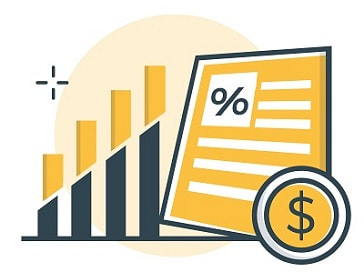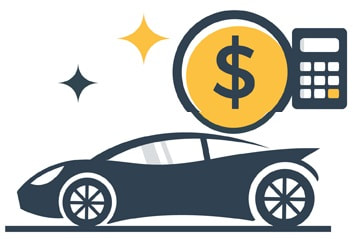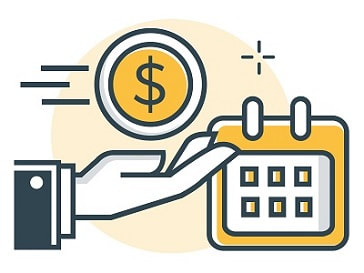Compound Interest Explained
Learn how compound interest boosts investment returns in savings, KiwiSaver, and funds, and understand its impact on loans and debts. Our examples and case studies demystify compound interest, showing you how to maximise wealth and manage financial obligations effectively.
Updated 7 January 2024
Summary:
To help you understand compound interest as an investor and as a borrower, our guide covers:
- Compound interest is a key concept in wealth building, especially for long-term investments like term deposits, KiwiSaver and managed funds.
- Unlike simple interest, which is calculated solely on the principal amount, compound interest is calculated on the principal plus previously earned interest. This means the interest you earn on a savings account, cash fund, term deposit or call account will, once credited, start earning interest, 'compounding' your returns.
- For example, an investment of $1,000 at an annual interest rate of 6.50%, compounded monthly for five years, and considering a 28% tax rate will see the investment grow to around $1,276 (after tax on the interest earned is paid).
- The power of compound interest is unrivalled when it comes to investment returns. Albert Einstein is famously quoted as saying, "Compound interest is the eighth natural wonder of the world and the most powerful thing I have ever encountered". Warren Buffett, one of the most successful investors in history, is a fan, commenting, "My wealth has come from a combination of living in America, some lucky genes, and compound interest".
- While compound interest is arguably a simple concept to explain, our definitive guide is published to explain its importance and why it's an essential wealth-creating tool.
To help you understand compound interest as an investor and as a borrower, our guide covers:
Compound Interest in Savings and Investments
Banks and fund managers offer various accounts where the interest can be compounded. And, as the low-interest era is long over, everyday New Zealand savers are now earning at least 5% on top-ranking call accounts, term deposits and cash funds.
However, the compounding frequency can significantly affect the amount of interest earned. If your investment compounds monthly, your interest rate is effectively higher than if it compounds quarterly or annually, all other things being the same.
How much difference does the compound frequency make?
This is best answered with an example. For an investment of $10,000 at an annual interest rate of 5% over three years, considering a 28% tax rate, the returns after tax under different compounding frequencies are as follows:
These calculations show that, even after applying a 28% tax rate, the monthly compounding in the Cash Fund generates a slightly higher return than the quarterly compounding in the Bank's Term Deposit. This difference is solely due to interest being compounded monthly versus four times yearly. While the example shows a small difference over long periods, even small differences in compounding frequency can lead to significant differences in interest earned.
However, the compounding frequency can significantly affect the amount of interest earned. If your investment compounds monthly, your interest rate is effectively higher than if it compounds quarterly or annually, all other things being the same.
How much difference does the compound frequency make?
This is best answered with an example. For an investment of $10,000 at an annual interest rate of 5% over three years, considering a 28% tax rate, the returns after tax under different compounding frequencies are as follows:
- Bank Term Deposit (Quarterly Compounding): The future value after tax with quarterly compounding is approximately $11,157.43.
- Cash Fund Account (Monthly Compounding): The future value after tax with monthly compounding is approximately $11,162.60.
These calculations show that, even after applying a 28% tax rate, the monthly compounding in the Cash Fund generates a slightly higher return than the quarterly compounding in the Bank's Term Deposit. This difference is solely due to interest being compounded monthly versus four times yearly. While the example shows a small difference over long periods, even small differences in compounding frequency can lead to significant differences in interest earned.
Compound Interest in Loans and Debts
Just as compound interest can work in your favour for savings, it can also work against you in debt. Credit cards, loans, car finance and other lending work best for the borrower when they minimise the compound interest generated.
If not managed carefully, compound interest on debts can significantly increase the total amount payable. For many New Zealanders, this situation is a long-term and painful problem that diverts hard-earned after-tax income to repaying debt and interest costs.
If not managed carefully, compound interest on debts can significantly increase the total amount payable. For many New Zealanders, this situation is a long-term and painful problem that diverts hard-earned after-tax income to repaying debt and interest costs.
MoneyHub Founder Christopher Walsh comments on why lenders want you in debt for as long as possible:
|
"Lending is a big business in New Zealand, and many companies make healthy profits year after year by keeping people in debt. It's quite simple - lenders often borrow money at around 5% p.a. and lend it out at 15% or 20% p.a. (or even higher). The difference is their profit, less the costs of running their business and the bad debts incurred when some people don't repay. If a lender can keep someone in a $10,000 debt, paying 20% p.a., then some bad players will ensure the borrower is always enticed to stay in debt as it's very profitable.
I've heard a few tricks on how this works. One offers a new loan at favourable rates (and possibly no application fee) just as the existing loan is about to be repaid. Another is to make the borrower purchase an item from a related retailer at an inflated interest rate and long repayment terms to maximise the interest charged. There are others, including high-interest credit cards that compound their interest charges daily. In summary, the tricks used are designed to keep borrowers in debt paying interest to their lenders for as long as possible. It's a big problem throughout New Zealand and a wealth transfer from those who can least afford it. The scenarios below illustrate how compound interest can substantially impact various forms of personal debt. By taking some tough decisions and increasing repayment amounts, making lump-sum payments, or refinancing, you can manage and minimise the effects of compound interest on these annoying and expensive debts". |
Christopher Walsh
MoneyHub Founder |
Our examples explain these situations better:
Credit Card Example:
Personal Loan Example:
Car Finance Example:
Credit Card Example:
- Scenario: Jane has a credit card with a 23.99% annual interest rate, compounding monthly. She has a $7,000 balance and only makes the minimum payment of 3% each month.
- Trigger for Compound Interest: The compound interest accrues due to the monthly unpaid balance, which grows with added interest.
- Compound Interest Minimisation Strategies: Jane can manually repay an amount each week to reduce the balance faster and alter her choice of minimum payment to a higher (yet affordable) amount to get the debt repaid.
Personal Loan Example:
- Scenario: Emily has a personal loan of $10,000 at a 15% annual interest rate, compounded monthly, to be repaid over five years.
- Trigger for Compound Interest: The interest compounds monthly on the outstanding loan balance.
- Compound Interest Minimisation Strategies: Emily can make occasional lump-sum payments to reduce the principal and interest, and accelerating repayments to settle the loan earlier will reduce total interest.
Car Finance Example:
- Scenario: Alex has financed a car for $20,000 with a 12% annual interest rate, compounding monthly over a 5-year term.
- Trigger for Compound Interest: Interest compounds on Alex's outstanding loan amount each month.
- Compound Interest Minimisation Strategies: If available, Alex can refinance the loan at a lower interest rate and make higher monthly payments than required to decrease the principal and total interest.
Maximising Investment Returns with Compound Interest
Compound interest is an investor's tailwind. However, to maximise your dollar returns, we've shortlisted several tips:
Know This: The power of time is unrivalled: The longer the investment period, the more significant the compounding effect. Even with small amounts, starting early can lead to substantial growth due to compound interest. Our case study of Sam and Alex explains this further:
Our comparison looks at how Sam's ten extra years of compound interest significantly boosted her total savings by retirement, compared to Alex's savings. After doing the calculations, here's what we find for Sam and Alex:
This stark difference of over $108,000 highlights the power of starting early. Sam's additional ten years of compound interest significantly increased her savings by retirement compared to Alex, despite them both investing the same annual amount and achieving the same annual return rate.
- Consistent Contributions are essential: Regularly contributing to investment accounts, irrespective of market fluctuations, allows investors to benefit from dollar-cost averaging and compound interest. The financial markets will always fluctuate, but routine investing is the best way to compound returns.
- Diversification is critical: Investing in a mix of assets (shares, real estate, term deposits) can optimise returns and mitigate risks. Diversification helps smooth out the volatility in any investment type, enabling compound interest to work more steadily over time across your entire portfolio.
- Reinvestment of earnings super-charges your returns: Reinvesting dividends and interest payments back into the investment accelerates compound interest. This strategy can significantly increase the value of an investment over time.
- KiwiSaver is essential to growing wealth and maximising returns: KiwiSaver is, unfortunately, misunderstood by many, with a sizeable percentage of New Zealanders not contributing even if they are members. Your KiwiSaver balance grows from what you contribute, your employer (3% of your salary) and an annual $521 government top-up. The compounding effect in KiwiSaver accounts comes from these contributions and the investment returns reinvested into the account.
- Managed Funds and ETFs compound returns to build wealth and should be considered: These investments pool money from many investors to invest in a diverse portfolio. Managed funds offer different levels of risk and potential return, capitalising on compound interest over long periods as returns grow.
- Term Deposits and Savings Accounts are secure options for stable growth: Term deposits and savings accounts may offer lower returns than shares or real estate, but they provide a secure, steady platform for compound interest to accrue. Especially suitable for conservative investors, these options ensure your capital is not exposed to high market volatility while benefiting from compound growth over time.
Know This: The power of time is unrivalled: The longer the investment period, the more significant the compounding effect. Even with small amounts, starting early can lead to substantial growth due to compound interest. Our case study of Sam and Alex explains this further:
- Sam starts investing at 25, and Alex begins at 35. Both invest the same amount annually and achieve the same annual return rate.
- Sam's Early Start: Sam begins investing $2,000 annually at an annual return rate of 5%. She continues this for 40 years, stopping at age 65.
- Alex's Later Start: Alex invests $2,000 annually at a 5% return rate but starts at age 35, giving him a 30-year investment period.
Our comparison looks at how Sam's ten extra years of compound interest significantly boosted her total savings by retirement, compared to Alex's savings. After doing the calculations, here's what we find for Sam and Alex:
- Sam, who started investing at 25, will have approximately $241,599.55 by age 65.
- Alex, who started investing at 35, will have approximately $132,877.70 by the same age.
This stark difference of over $108,000 highlights the power of starting early. Sam's additional ten years of compound interest significantly increased her savings by retirement compared to Alex, despite them both investing the same annual amount and achieving the same annual return rate.
Compound Interest and Tax Implications - What you need to know:
Taxation of Interest: When you earn interest on savings or investments, this interest is considered taxable income. The tax you pay on this interest can reduce the overall return on your investment. This means there's less money available to benefit from compound interest. Choosing the correct PIR is important because it affects the amount of tax you pay on your investment earnings. The right PIR ensures you're taxed appropriately, which can influence the compounding effect of your returns.
However, it's important to understand that KiwiSaver investments (and other managed funds) are still subject to tax - this Stuff.co.nz article from September 2023 explains this in detail.
However, it's important to understand that KiwiSaver investments (and other managed funds) are still subject to tax - this Stuff.co.nz article from September 2023 explains this in detail.
How Compound Interest Impacts Inflation, Retirement and the Economy (For Investors)
To help explain these important considerations, our approach is to present them as questions below:
How Does Inflation Impact Compound Interest, and what is the relationship between inflation and compound interest?
Inflation reduces the real value of money over time, which can impact the actual returns of investments, earning compound interest. Even if an investment grows due to compound interest, high inflation rates can erode the purchasing power of the returns.
How can I mitigate the impact of inflation on my compound interest earnings?
Investing in assets that historically outpace inflation, such as stocks or real estate, can help. Additionally, choosing investment vehicles with interest rates higher than the current inflation rate can also mitigate its impact.
Why is compound interest important in retirement planning? How should I incorporate compound interest into my retirement planning?
Compound interest can significantly increase retirement savings over time. The longer your retirement funds are invested, the more potential they have to grow exponentially due to the compounding effect.
To help maximise the benefits of compound interest, the common approach is to start saving as early as possible and contribute regularly to your retirement accounts, like KiwiSaver. Consider investments with a mix of growth-oriented assets to maximise the compounding effect.
To help maximise the benefits of compound interest, the common approach is to start saving as early as possible and contribute regularly to your retirement accounts, like KiwiSaver. Consider investments with a mix of growth-oriented assets to maximise the compounding effect.
How does compound interest work in a fluctuating economy? Can compound interest benefit me during an economic downturn?
In a volatile economy, investments earning compound interest can experience varying rates of return. Diversification can help manage risk and capitalise on the compound interest in different economic conditions.
If you continue to invest during a downturn, you might benefit from lower prices and higher potential growth when the economy recovers. This is particularly effective for long-term investments that can ride out market fluctuations.
If you continue to invest during a downturn, you might benefit from lower prices and higher potential growth when the economy recovers. This is particularly effective for long-term investments that can ride out market fluctuations.
Does compound interest work differently in a recession compared to a booming economy?
The fundamental principle of compound interest remains the same, but the actual returns may vary. In a booming economy, returns might be higher, while in a recession, they could be lower. However, consistent long-term investment is key to leveraging compound interest effectively in any economic scenario.
Frequently Asked Compound Interest Questions
How do I earn Compound Interest?
Both bank deposits and term investments earn interest, but the frequency with which they pay that interest affects the compound interest you can receive. For example, if you invest $1,000 with Bank ABC for 12 months and it pays 5.00% p.a. interest on a monthly basis, the interest you earn will compound every month. Alternatively, if the interest is only paid at the end of the 12 months, then there is no compounding interest.
Which is better, 'Simple interest' or 'Compound interest'?
When it comes to savings and investing, compound interest is better. This is because simple interest is calculated only on the original investment and paid at the end of the term, whereas compound interest is calculated on the original investment amount and the accumulated interest earned over previous periods. For this reason compound interest is known as "interest on interest.”
What is the purpose of compound interest?
Compound interest is attractive if you are earning it - bank deposits and term deposits usually pay compounded interest. However, if you are in debt, credit cards typically charge compound interest on the principal amount and the accumulated interest owed. This means that if you have an unpaid $1,000 credit card bill, you'll pay interest on the amount due. Whatever you don't pay will continue to be charged interest, so you will need to pay interest on the interest charged, as well as the original debt.
What is an example of compound interest?
In the example below, you can see a $10,000 investment earning 5.00% p.a. earns $500 of interest in year one, growing to $525 and $551.25 in years 2 and 3, respectively, because of the effect of compound interest. The interest earned from each period (I) is added to the opening balance (O) and increases each year as a result of the 5.00% interest rate being applied to a bigger balance.
Year |
Opening Balance (O) |
Interest (I) |
Closing Balance (O+I) |
1 |
$10,000 |
$500 |
$10,500 |
2 |
$10,500 |
$525 |
$11,025 |
2 |
$11,025 |
$551.25 |
$11,576.25 |
|
Total Interest |
$1,576.25 |
- |
How often is interest compounded?
The most common compound interest-earning investment is a bank account, and it is common for interest to be paid daily or at least monthly. For mortgages, personal loans and credit cards, interest is typically compounded monthly. Certain credit cards, like GEM Visa and the Q Card compound interest daily.







